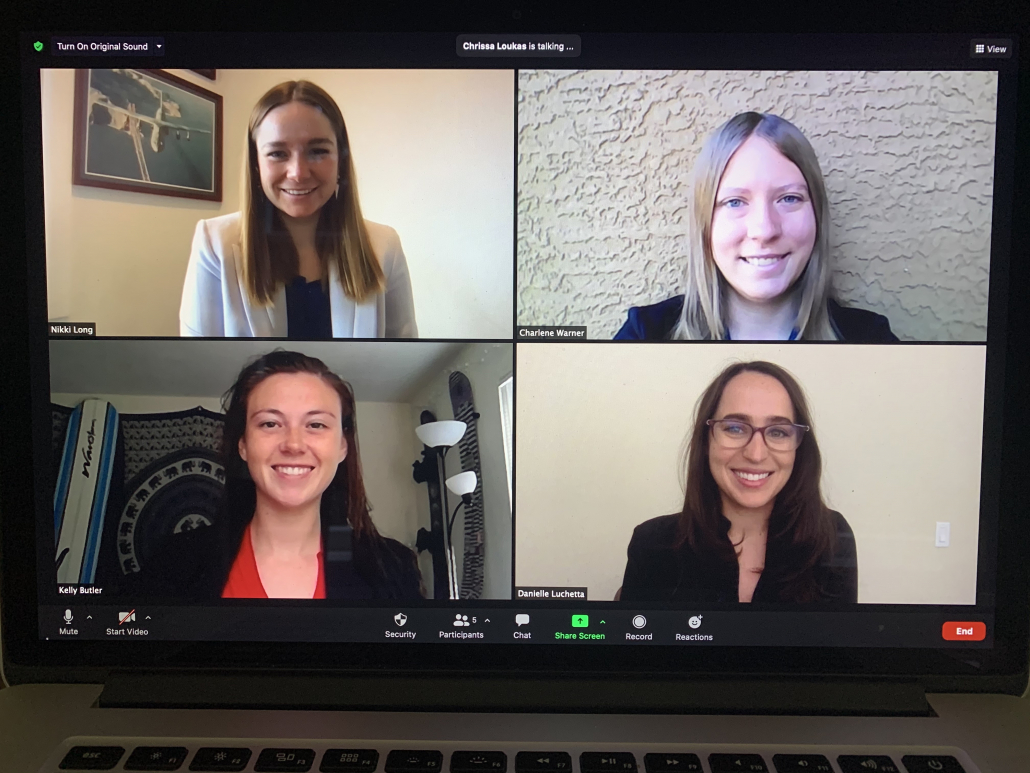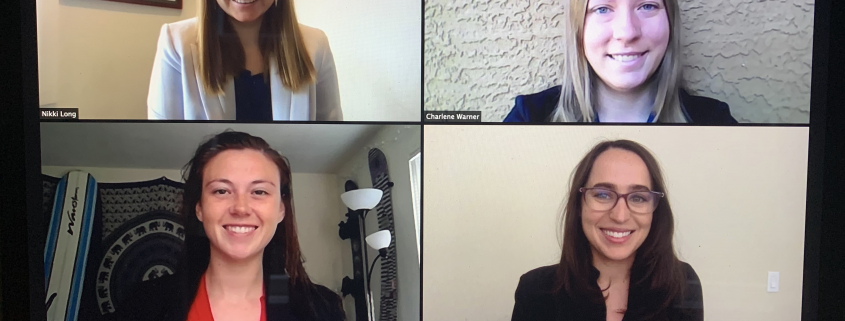Gould moot court team places highly at regional competition

The American Bar Association’s National Appellate Advocacy Competition would usually take place in courtrooms around the country. However, due to the coronavirus pandemic, participants competed from home.
For Charlene Smith, this meant competing from her living room, where she had to tell her husband to leave because audience members weren’t allowed to be present while competing. According to Smith, the experience was “definitely different” than it would have been in person.
“When you’re in a courtroom, it’s like you’re having a conversation with the judges, and they’re slightly above you, so you’re a little intimidated, but then you’ve got that adrenaline rush going … so it’s super exciting in that way,” Smith said. “Over Zoom, it felt like I was talking to professors or lawyers, and it didn’t feel quite as intimidating.”
Despite competing remotely, the USC Gould National Moot Court team finished in third and fourth place at one of the regional competitions of the American Bar Association’s National Appellate Advocacy Competition (NAAC) recently. The team was also recognized in the top 10 advocates list.
The moot court team, composed of third-year J.D. students Nikki Long, Charlene Smith, Kelly Butler and Danielle Luchetta, recently competed at the NAAC and earned top places in the regional battle in San Francisco. Long and Luchetta won third place for best brief, with Smith and Butler taking fourth place.
Led by adviser Rebecca Lonergan, professor of lawyering skills and associate director of the legal writing and advocacy program at the Gould School of Law, the Gould team was the only team to win two spots in the top five briefs of the San Francisco region. Long was also honored among the top ten best advocates of the competition.
“They did a fabulous job,” Lonergan said. “I watched them grow through all those practice sessions, I watched them become better and better and better at their arguments, and I’m like, ‘That’s what you have to come away from it with.’”
The path toward the NAAC competition began last November after the four law students were chosen among many applicants to make up USC’s national moot court team. According to Smith, after making the team, the students met with Lonergan, who introduced them to the competition and guidelines around it. The two main aspects of the competition were writing briefs and preparing oral arguments about qualified immunity to present in front of judges the following spring.
The team wrote an approximately 50-page brief over winter break and found two additional faculty advisors to help them prepare for the competition — Sam Erman, professor of law, and Rebecca Brown, professor of law and the Rader Family trustee chair in law.
“It was very intense, but we were just loving it,” Long said. “It wasn’t arduous work. It was enjoyable work. So, I think for us, the more preparation we could get, the better, so that way, we felt comfortable and went to the competition.”
According to Lonergan, the moot court team spent many hours and days preparing, dedicating their weekends and evenings to meet with her through Zoom, where she would “grill them” and would go through their presentations in order to help them improve.
The moot court team praised their advisors and said they played an important part in the training process. Long said all three law professors were instrumental to their success.
“[The advisors] spent hours with us listening to our arguments, asking questions about our arguments, giving us tips and feedback, and I can’t imagine having a better group of coaches for that,” Long said.
At the competition in February, a panel of three to four judges would hear the team’s arguments and ask questions about the cases the team was presenting. Each person had 15 minutes in each round to argue their cases and two minutes for rebuttal.
One of the team’s challenges was that they had to compete over Zoom, rather than in a courtroom, where this competition was held pre-pandemic.
“It was hard to understand the judges or you do the awkward thing where you talk over them and you don’t know who’s going to talk because it’s on Zoom,” Butler said. “Then also just not being able to be near my teammates. I feel like that would have been a good morale boost.”
Besides the challenges, Smith said that the process could be subjective, and to remember that sometimes the judges may not like the argument or they may not connect with the person delivering them.
“The main goal, I think, is to become a better oral advocate, not simply just focused on winning,” Smith said. “Because you can’t really control the outcome, you can only control what areas you’re growing, and that’s beautiful.”
While the team did not advance to the next round of the competition, each member will begin their preparations to take the bar exam in the next few months.
Long aims to go into litigation and dreams of arguing important cases in high courts. Smith’s goal is to be an excellent advocate for her clients and explore positions such as a judge or a solicitor general. Both Butler and Luchetta will be going into litigation as well.
The lessons that they took from the competition are ones that will last them beyond their time in law school. Luchettta said this competition helped her refine both of her writing and oral skills.
“Looking back on it, I have to say that it will go down as one of my most memorable experiences at Gould,” Luchetta said. “It is so rewarding to be able to work with some of the best professors that our school has, and also our teammates who are just so talented.”

